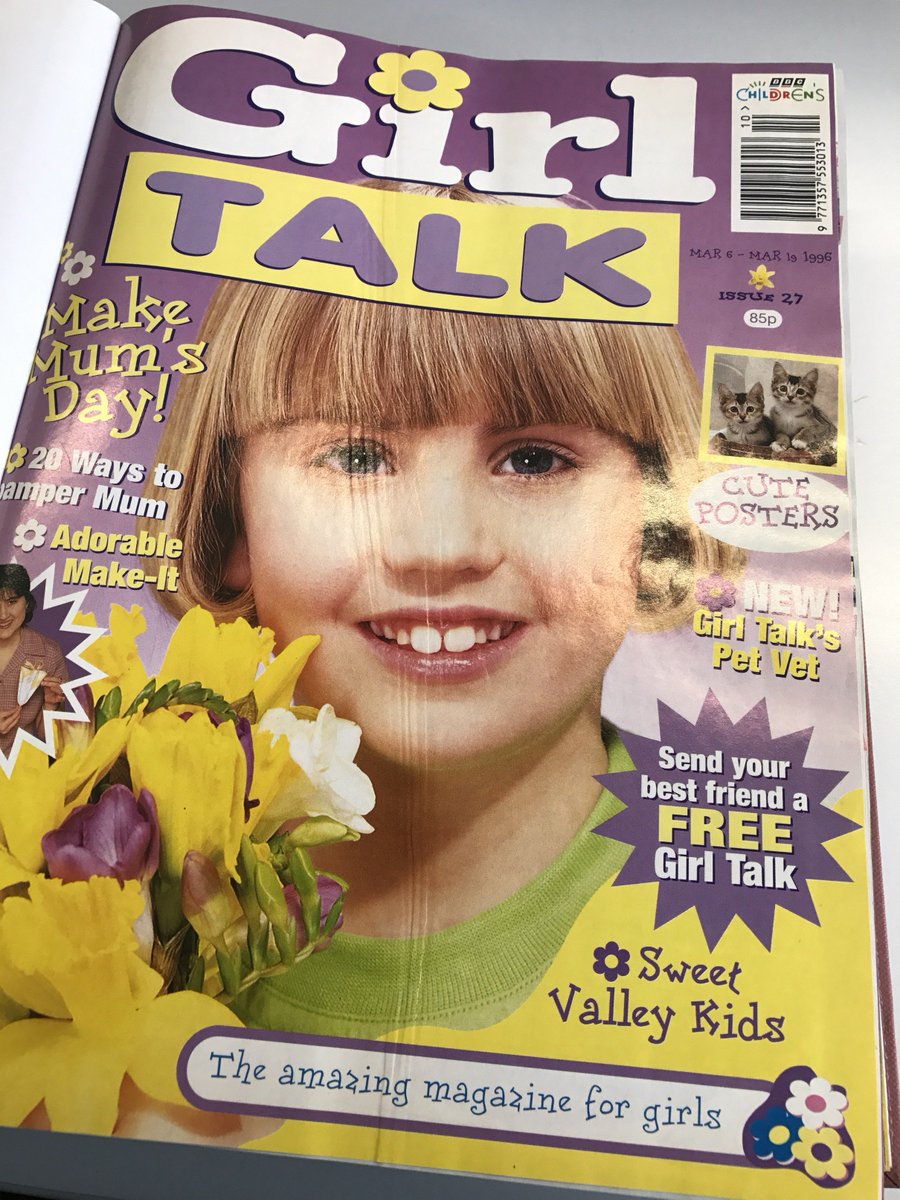Assumptions about our customer — Girl talk

I awoke after a nightmare early this morning. And my thoughts drifted off to my youth. 13 was probably a nightmarish time for a lot of us, but I feel like us 13 year old girls had it particularly bad if you were a teen girl pre Y2K.
When I was 13 there were two magazines that were popular. Mizz and Girl Talk. Illustrated below:
To clarify, these magazines have later publications than the 90’s, which I can’t speak on. I’m talking about THE NINETIES here.


They may seem like they’re for two way different demographics, as Girl Talk features a much younger cover model (one who actually looks 12) whereas Mizz features girls that look to be about 15/16. But this is an intentional part of the marketing, which we’ll explore.
When I was 12, I went to stay with my Great Aunt (sorry Aunty Dee I hope you aren’t reading this). As she lived in the country side and there isn’t all that much for 12 year old girls to do there, she asked me what magazines I would like. I requested, of course, Mizz. Which my friends and I read religiously and devoured. However, she bought me Girl Talk.
And this was a perfect illustration of what older people think tween girls should be interested in, vs what they’re *actually interested in*.
Why Mizz was good.
At 12/13 I was on the cusp of some major changes in my life. I knew that one day, within the next few years, I would be expected to grow boobs, have my first kiss and do well in my GCSE’s to be considered socially normal. How all this was supposed to happen, when I was barely able to make my way through Pokemon Red efficiently, was beyond me. I was pretty sure that I would never be found attractive by any boy ever. The fact that I had gone to John Lewis with my Mum for a bra fitting and had not even managed to get on the list for bra sizes and been sent to the ‘training bra’ section was totally normal, but felt mortifying — several of the girls in my P.E class had GIANT BREASTS which they would flaunt in the changing rooms. At 13, this was one of my main life concerns.
And yet, what if it happened. What if suddenly, people remarked that I had blossomed into a woman next year. I had heard it could happen suddenly (it never actually happened, for me). What if, in Y9, I went back to school no longer a 5”10 flat chested weirdo, but a curvy, confident babe?? Then I would need to know what to do in the unlikely instance that a boy would try and pressure me into doing something with him, and I would also need to know what those things might be.
There were also other things I wanted out of life. Sure I was just a school kid, but I wanted to know what career I should do. I wanted to learn about entrepreneurship. How to do well in a job interview for Superdrug (I didn’t get the job, by the way). Those kinda things.
Why Girl Talk sucked.
Teenagers want to know about the next stage of their life and how to prepare for it. Out of everything I’ve done in my life, going to uni, moving country, getting married, having a kid. Whether I would or would not manage to successfully kiss someone one day felt like a bigger deal at the time than all of those other life events, as ridiculous as it sounds. And I think that’s pretty normal.
Back in the 90’s there was still the expectation that girls shouldn’t want sex, money or status. And should concern themselves with the things in Girl Talk — posters of kittens. 21 ideas for how to pamper their mother. Making a flower wreath.
In reality teenage girls are just as horny, embarrassing and tragic as teenage boys. But unlike teenage boys — we knew that we weren’t really allowed to be. It was a secret that our Dads must never ever find out about. But Mizz knew this about us.
Don’t get me wrong, kittens are great. But they aren’t interesting. And when I was a little girl, way back in the day when I wasn’t obsessed with breast growth yet, I still wasn’t interested in pampering my mum, or kittens. I read magazines with 3D glasses pictures of bugs, and The Beano. I spent my time catching tad poles and frogs, climbing trees, playing Super Mario. Y’know, just like boys do. There’s never been a kitten shaped gap in my entertainment. Regardless of how much my Great Aunt thought there should be, or that reading a magazine with a ‘problem’ in the problem page about *ahem* ☝️, would turn me into a mucky woman.
Where am I going with this?
This is an extreme example of how making assumptions about your customer can place you in the wrong category. Girl Talk failed to sell to their demographic and instead attracted Nannans. Sure, being a 13 year old girl is politically loaded. But I see less extreme instances from time to time.
The fact is when you’re in a business, it’s really hard to see things from a customers perspective. And it can be hard to understand the complexity of being that customer unless you’ve been there yourself.
It’s really hard for me, for example, to understand what it’s like to be an extremely successful and wealthy 50 year old man. And if I were to go off my assumption about men in that position, I’d be wrong. From my perspective at 20 — men in those positions were all powerful, all scary and all confident. Their lives had probably been easy. In reality, the situation is more complicated. Although I was brought up to always defer to men, I’ve learned that the only reason a client like this would contact me in the first place is because they need me to tell them what to do in a specific area of their marketing. They have a lot on their plates and can’t learn and know everything, it’d distract them from more important areas.
What I absolutely cannot do as a marketer is hear that your customer is a wealthy old lady, or a 35 year old tradesman, or a 5 year old boy and make assumptions about that person.
Here are a few customer assumptions I’ve come across:
- My customer understands this technical language, because they’re smart — they work in I.T. (Does everyone in I.T know about every area of I.T?)
- My customer will hesitate about buying a £3,000 hoodie, because it’s expensive (is it expensive to them?)
- Only middle class people from good areas will be able to afford a £70 audiology appointment, so lets exclude people from ‘bad’ areas. (Are there people who live in expensive areas, who are broke? Are there people who live in less expensive areas who have lots of money? Is £70 too much money to someone who is not wealthy?)
- Our customers are wealthy because they shop at Waitrose, so they will be interested in other luxury goods. (What if they just shop at Waitrose but they are not wealthy?)
- Our product is the most expensive option in this retailer, so this is a luxury product. (But there are artisan options that are x5 the price elsewhere, being expensive in Tesco and being expensive at the local Deli are two different things).
- Our product is expensive so young people won’t be able to afford it. (Do young people ever prioritise quality?)
- Our customer is young so they’ll be interested in partying. (Have young people changed since 2010?)
- Our customer is over 30 so they won’t be on Tik Tok. (You’re over estimating us)
You get the gist. Usually assumptions are about age, gender, wealth and intelligence.
While some assumptions are fair to make. E.g it would be likely that someone who is building a 16 million pound house is wealthy. Some are much more of a reach. E.g Coca Cola is more expensive than own brand, therefore people who buy branded Coca Cola are richer than people who buy super market brand cola.
Some examples of some good customer generalisations based on research:
- Our customers are mums, they’re tired. Their kids constant snack requests are tiresome and making lunch boxes every night is boring. Seeing people make fancy lunch boxes on instagram is just making them feel inadequate.
- Our customers have a high level of knowledge about their health. But we want to expand our customer base. Let’s target people who know a little bit and want to make changes, and make the more in-depth info for our current customers.
- Our customers are women over 50 who have house hold incomes over 60k. They are prioritising their health and wellness after years of caring for others. They’re interested in things like journaling, yoga and meditation but aren’t usually experts so we need to keep it quite light.


Leave a Reply